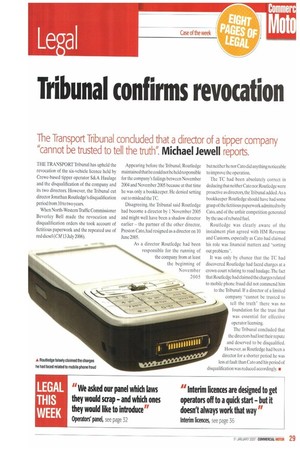Tribunal confirms revocation
Page 29

If you've noticed an error in this article please click here to report it so we can fix it.
The Transport Tribunal concluded that a director of a tipper company "cannot be trusted to tell the truth". Michael Jewell reports.
THE TRANSPORT Tribunal has upheld the revocation of the six-vehicle licence held by Crewe-based tipper operator S&A Haulage and the disqualification of the company and its two directors. However, the Tribunal cut director Jonathan Routledge's disqualification period from 10 to two years.
When North-Western Traffic Commissioner Beverley Bell made the revocation and disqualification orders she took account of fictitious paperwork and the repeated use of red diesel (CM13 July 2006). Appearing before the Tribunal, Routledge maintained that he could not be held responsible for the company's failings between November 2004 and November 2005 because at that time he was only a bookkeeper. He denied setting out to mislead the TC.
Disagreeing, the Tribunal said Routledge had become a director by 1 November 2005 and might well have been a shadow director earlier — the partner of the other director, Preston Cato, had resigned as a director on 10 June 2005.
As a director Routledge had been responsible for the running of the company from at least the beginning of November 2005 but neither he nor Cato did anything noticeable to improve the operation.
The TC had been absolutely correct in deducing that neither Cato nor Routledge were proactive as directors, the Tribunal added. As a bookkeeper Routledge should have had some grasp of the fictitious paperwork admitted to by Cato, and of the unfair competition generated by the use of rebated fuel.
Routledge was clearly aware of the instalment plan agreed with HM Revenue and Customs, especially as Cato had claimed his role was financial matters and "sorting out problems".
It was only by chance that the TC had discovered Routledge had faced charges at a crown court relating to road haulage. The fact that Routledge had claimed the charges related to mobile phone fraud did not commend him to the Tribunal. If a director of a limited company "cannot be trusted to tell the truth" there was no foundation for the trust that was essential for effective operator licensing.
The Tribunal concluded that the directors had lost their repute and deserved to be disqualified. However, as Routledge had been a director for a shorter period he was less at fault than Cato and his period of disqualification was reduced accordingly. •










































































































































































